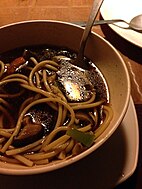Thukpa
 Thukpa, a dish from Ladakh | |
| Type | Soup |
|---|---|
| Place of origin | Amdo, Tibet |
| Region or state | Tibet, Nepal, Qinghai, Sichuan |
| Associated cuisine | Tibetan cuisine |
| Main ingredients | Vegetables |
Thukpa (Tibetan: ཐུག་པ; IPA: /tʰu(k̚)ˀ˥˥.pə˥˥/ ) is a Tibetan noodle soup, which originated in the eastern part of Tibet.[1] Amdo thukpa, especially thenthuk, is a variant among the Indians, especially Ladakhis and the Sikkimese.[2] Thukpa can be prepared in both vegetarian and non-vegetarian variations; the most popular non-vegetarian variation includes chicken.[3]
Varieties of thukpa include:
- Thenthuk (Tibetan: འཐེན་ཐུག་, Wylie: 'then thug): Hand-pulled noodle
- Gyathuk (Tibetan: རྒྱ་ཐུག་, Wylie: rgya thug): Chinese noodle
- Bhakthuk (Tibetan: བག་ཐུག་, Wylie: bag thug): Hand-rolled pinched noodle (like gnocchi)
- Tsapthuk (Tibetan: འབྲས་ཐུག་, Wylie: 'bras thug): chopped noodle
Etymology
[edit]Thukpa has been described as a "generic Tibetan word for any soup or stew combined with noodles".[4]

Regional traditions
[edit]Indian thukpa
[edit]In India, the dish is consumed by people of Nepalese and Tibetan origin in the state of Sikkim, the district of Darjeeling and the union territory of Ladakh.
Nepalese Thukpa
[edit]The Nepalese version of Thukpa has a predominant vegetarian feature and a bit of spicier flavor. The protein ingredients of the dish are given vegetarian alternative according to availability, including beans, chickpeas, gram, kidney beans, etc. However, non-vegetarian thukpa are also enjoyed by non-vegs. Egg thukpa is probably the second most popular variety after vegetarian thukpa among Nepalese. Coriander leaves, spring onion, or garlic leaves are the popular Nepalese choices of garnish.
Bhutanese thukpa
[edit]The Bhutanese version of Thukpa tends to be sweeter than the Nepali version. It is very popular amongst tourists especally Indian, American and Russian tourists.
Gallery
[edit]See also
[edit]External links
[edit]References
[edit]- ^ Singh Verma, Aditya (2019-07-05). "Thukpa – A cultural journey through the Tibetan community in India". Tibet Post. Archived from the original on 2022-10-08. Retrieved 2022-11-18.
- ^ Hauzel, Hoihnu (2016-02-16). "The Tale of Thukpa: What Lends Flavour to this Comforting Noodle Soup?". NDTV Food. Archived from the original on 2022-10-07. Retrieved 2022-11-18.
- ^ Galarza, G Daniela (2021-11-06). "This noodle soup will warm you right up » Borneo Bulletin Online". Borneo Bulletin. Archived from the original on 2021-11-06. Retrieved 2022-11-18.
- ^ Boi, L.G.; Ltd, M.C.I.P. (2014). Asian Noodles. EBL-Schweitzer. Marshall Cavendish. p. 163. ISBN 978-981-4634-98-4.


